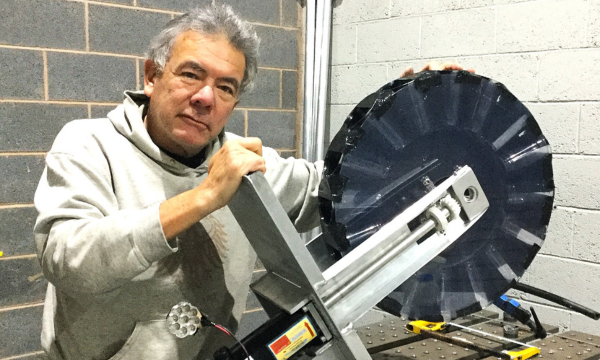Innovative technology being developed in North Wales could be the ‘missing link’ that facilitates cost-effective carbon capture on a global scale.
With the support of Bangor University, Robert Lim Inventions Ltd is preparing to unveil its patented enclosed engine system while raising necessary funding to take the concept to commercialisation.
Led by director James Sheridan, the Deeside company is working with the University to analyse and evaluate its ground-breaking carbon capture process, having successfully received a £10,000 Skills Innovation Voucher (SIV).
The SIV scheme offers companies in Gwynedd, Anglesey and Flintshire an opportunity to collaborate through the UK Government’s Shared Prosperity Fund.
Robert Lim Inventions has joined forces with Professor Michael Rushton and his team in the Nuclear Futures Institute, to rigorously test a key part of the patented process before unlocking investment and revenue streams.
Sadly, Robert passed away last year, but James – a prominent consultant, author and entrepreneur based in Anglesey – says they are determined to bring it to market and cement his legacy.
“Robert designed, built a prototype and filed a patent on this system, which captures carbon dioxide whilst simultaneously producing electricity, thereby facilitating a much more cost-effective process which we believe if we prove concept could be key to enabling the system’s adoption on the massive worldwide scale required to support climate change,” said James.
“Environmental damage caused by an increase in carbon dioxide in the earth’s atmosphere is acknowledged as a threat to the planet’s future, and clean growth and de-carbonisation targets have been imposed on governments and local authorities in an attempt to halt that, so this could be one of the solutions needed to help tackle the issue.”
He added:
“Robert is very much missed and is a huge loss, but we have a strong team around us and with the UK patent granted for the enclosed engine we will continue to develop the concept through the pathway to commercialisation in the UK and on the international stage.”
The mechanical system is driven by a renewable energy source, with bellows pushing air into a liquid filled tank and turning paddles to generate electricity, captured in an adjacent battery and releasing carbon dioxide (CO2) into the liquid.

A ‘sticky liquid chemical’ process (currently using Monoethanolamine) then captures the CO2 while clean air is released into the atmosphere. When the liquid in the tank is saturated with CO2 a heating filament is activated, releasing the CO2 to be pulled into a secondary tank. It is then contained in storage, ready for industrial use or sequestration.
“With Bangor University’s support we are making strides, and the challenge now is to garner seed funding of up to £250,000 for fabrication of scaled prototypes, through to proof-of-concept trials and validation testing,” said James.
“It is an exciting time; Robert’s dream is becoming a reality, and we are thankful to Professor Rushton and the team for working in partnership with us to make it happen.”
Bangor University Business Development Manager Nicola Sturrs said the application for SIV support from Robert Lim Inventions is an example of how companies can access pivotal academic support to take their ideas forward.
“This is an innovative system which could have a major impact on the race to net zero, as private and public sector organisations look to lower their carbon footprints,” she added.
“We wish James and the team the very best of luck and are glad the SIV scheme has had a positive effect on them achieving their goals.”
The SIV project is funded by the UK Government through the UK Shared Prosperity Fund on behalf of Gwynedd County Council, Isle of Anglesey County Council and Flintshire County Council.
There are three types of vouchers available, redeemable in a range of areas including R&D, consultancy, skills and training, use of university facilities, use of specialist equipment, and access to knowledge.
They are:
Midi:
Up to £5,000 for five to eight days of support;
Maxi:
Up to £10,000 for 10 to 15 days of support, and;
Talent:
with a value up to £5,000 for a 12 week graduate internship.
